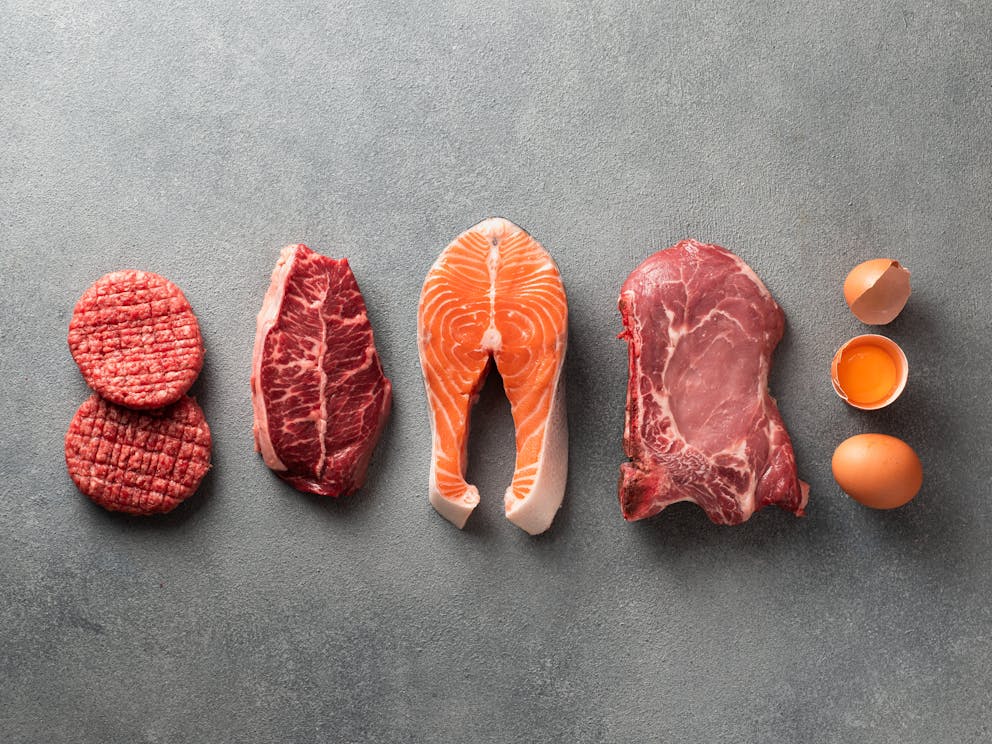Keto vs. Carnivore Diet – Which Is Better?

Keto Strategy Tips
Expert advice on maintaining a successful keto lifestyle
Learn simple strategies to overcome common challenges and stay on track
Stay motivated with tips and techniques to keep you focused on your keto journey
Practical cutout wallet guide for quick reference on keto-friendly choices and strategies

Keto Strategy Tips
Expert advice on maintaining a successful keto lifestyle
Learn simple strategies to overcome common challenges and stay on track
Stay motivated with tips and techniques to keep you focused on your keto journey
Practical cutout wallet guide for quick reference on keto-friendly choices and strategies

Keto Strategy Tips
Expert advice on maintaining a successful keto lifestyle
Learn simple strategies to overcome common challenges and stay on track
Stay motivated with tips and techniques to keep you focused on your keto journey
Practical cutout wallet guide for quick reference on keto-friendly choices and strategies

Keto Strategy Tips
Expert advice on maintaining a successful keto lifestyle
Learn simple strategies to overcome common challenges and stay on track
Stay motivated with tips and techniques to keep you focused on your keto journey
Practical cutout wallet guide for quick reference on keto-friendly choices and strategies

Keto Strategy Tips
Expert advice on maintaining a successful keto lifestyle
Learn simple strategies to overcome common challenges and stay on track
Stay motivated with tips and techniques to keep you focused on your keto journey
Practical cutout wallet guide for quick reference on keto-friendly choices and strategies

Keto Strategy Tips
Expert advice on maintaining a successful keto lifestyle
Learn simple strategies to overcome common challenges and stay on track
Stay motivated with tips and techniques to keep you focused on your keto journey
Practical cutout wallet guide for quick reference on keto-friendly choices and strategies

Keto Strategy Tips
Expert advice on maintaining a successful keto lifestyle
Learn simple strategies to overcome common challenges and stay on track
Stay motivated with tips and techniques to keep you focused on your keto journey
Practical cutout wallet guide for quick reference on keto-friendly choices and strategies

Keto Strategy Tips
Expert advice on maintaining a successful keto lifestyle
Learn simple strategies to overcome common challenges and stay on track
Stay motivated with tips and techniques to keep you focused on your keto journey
Practical cutout wallet guide for quick reference on keto-friendly choices and strategies

Keto Strategy Tips
Expert advice on maintaining a successful keto lifestyle
Learn simple strategies to overcome common challenges and stay on track
Stay motivated with tips and techniques to keep you focused on your keto journey
Practical cutout wallet guide for quick reference on keto-friendly choices and strategies

Keto Strategy Tips
Expert advice on maintaining a successful keto lifestyle
Learn simple strategies to overcome common challenges and stay on track
Stay motivated with tips and techniques to keep you focused on your keto journey
Practical cutout wallet guide for quick reference on keto-friendly choices and strategies

Keto Strategy Tips
Expert advice on maintaining a successful keto lifestyle
Learn simple strategies to overcome common challenges and stay on track
Stay motivated with tips and techniques to keep you focused on your keto journey
Practical cutout wallet guide for quick reference on keto-friendly choices and strategies

Keto Strategy Tips
Expert advice on maintaining a successful keto lifestyle
Learn simple strategies to overcome common challenges and stay on track
Stay motivated with tips and techniques to keep you focused on your keto journey
Practical cutout wallet guide for quick reference on keto-friendly choices and strategies

Keto Strategy Tips
Expert advice on maintaining a successful keto lifestyle
Learn simple strategies to overcome common challenges and stay on track
Stay motivated with tips and techniques to keep you focused on your keto journey
Practical cutout wallet guide for quick reference on keto-friendly choices and strategies

Keto Strategy Tips
Expert advice on maintaining a successful keto lifestyle
Learn simple strategies to overcome common challenges and stay on track
Stay motivated with tips and techniques to keep you focused on your keto journey
Practical cutout wallet guide for quick reference on keto-friendly choices and strategies

Keto vs. Non-Keto
Quickly compare keto-friendly foods with non-keto options for easy reference
Use this wallet card to make informed food choices while shopping or dining out
Identify fake keto foods and ingredients that you should avoid
Simplify decision-making with clear, practical guidelines

Keto vs. Non-Keto
Quickly compare keto-friendly foods with non-keto options for easy reference
Use this wallet card to make informed food choices while shopping or dining out
Identify fake keto foods and ingredients that you should avoid
Simplify decision-making with clear, practical guidelines

Keto vs. Non-Keto
Quickly compare keto-friendly foods with non-keto options for easy reference
Use this wallet card to make informed food choices while shopping or dining out
Identify fake keto foods and ingredients that you should avoid
Simplify decision-making with clear, practical guidelines

Keto vs. Non-Keto
Quickly compare keto-friendly foods with non-keto options for easy reference
Use this wallet card to make informed food choices while shopping or dining out
Identify fake keto foods and ingredients that you should avoid
Simplify decision-making with clear, practical guidelines

Keto vs. Non-Keto
Quickly compare keto-friendly foods with non-keto options for easy reference
Use this wallet card to make informed food choices while shopping or dining out
Identify fake keto foods and ingredients that you should avoid
Simplify decision-making with clear, practical guidelines

Keto vs. Non-Keto
Quickly compare keto-friendly foods with non-keto options for easy reference
Use this wallet card to make informed food choices while shopping or dining out
Identify fake keto foods and ingredients that you should avoid
Simplify decision-making with clear, practical guidelines

Keto vs. Non-Keto
Quickly compare keto-friendly foods with non-keto options for easy reference
Use this wallet card to make informed food choices while shopping or dining out
Identify fake keto foods and ingredients that you should avoid
Simplify decision-making with clear, practical guidelines

Keto vs. Non-Keto
Quickly compare keto-friendly foods with non-keto options for easy reference
Use this wallet card to make informed food choices while shopping or dining out
Identify fake keto foods and ingredients that you should avoid
Simplify decision-making with clear, practical guidelines

Keto vs. Non-Keto
Quickly compare keto-friendly foods with non-keto options for easy reference
Use this wallet card to make informed food choices while shopping or dining out
Identify fake keto foods and ingredients that you should avoid
Simplify decision-making with clear, practical guidelines

Keto vs. Non-Keto
Quickly compare keto-friendly foods with non-keto options for easy reference
Use this wallet card to make informed food choices while shopping or dining out
Identify fake keto foods and ingredients that you should avoid
Simplify decision-making with clear, practical guidelines

Keto vs. Non-Keto
Quickly compare keto-friendly foods with non-keto options for easy reference
Use this wallet card to make informed food choices while shopping or dining out
Identify fake keto foods and ingredients that you should avoid
Simplify decision-making with clear, practical guidelines

Keto vs. Non-Keto
Quickly compare keto-friendly foods with non-keto options for easy reference
Use this wallet card to make informed food choices while shopping or dining out
Identify fake keto foods and ingredients that you should avoid
Simplify decision-making with clear, practical guidelines

Keto vs. Non-Keto
Quickly compare keto-friendly foods with non-keto options for easy reference
Use this wallet card to make informed food choices while shopping or dining out
Identify fake keto foods and ingredients that you should avoid
Simplify decision-making with clear, practical guidelines

Keto vs. Non-Keto
Quickly compare keto-friendly foods with non-keto options for easy reference
Use this wallet card to make informed food choices while shopping or dining out
Identify fake keto foods and ingredients that you should avoid
Simplify decision-making with clear, practical guidelines
Keto vs. carnivore diet—which is better?
While both keto and carnivore diets can promote weight loss and blood sugar control, consuming only animal products can lead to nutrient deficiencies and long-term health issues.
Discover who may benefit from a carnivore diet and learn how a nutritious low-carb diet like Healthy Keto® can unlock your long-term health goals.

What is the ketogenic diet?
The ketogenic diet is a low-carb, high-fat, and moderate-protein diet that primes your metabolism to burn fat instead of carbs for energy.
As your liver breaks down stored or dietary fat, it produces large quantities of ketones, a by-product of fat metabolism and a highly efficient energy source. When your cells utilize ketones as fuel, your body enters ketosis.
Dietary carbohydrate intake raises blood sugar which triggers the release of insulin, a crucial metabolic hormone that blocks your liver from converting fats to energy, leading to increased fat storage and weight gain.
To maintain fat-burning and benefit from the profound health benefits of ketosis, it’s crucial to consume no more than 20 to 50 grams of net carbs daily and obtain most of your daily calories from healthy fats.
Some critics often point out that keto diets increase the risk of nutrient deficiencies due to limiting food groups such as grains, fruits, and starchy vegetables.
That’s why it's crucial to do a Healthy Keto® diet that avoids processed foods and focuses on nutrient-rich, low-carb whole food options to provide all nutritional needs while burning fat.
Health benefits of keto
The keto diet has impressive health benefits and has helped many people to achieve a healthy weight and improve their well-being.
A study published in The Journal of Nutrition summarizes that a high-fat diet improves blood sugar regulation and metabolic health and is associated with a reduced risk of common lifestyle diseases such as obesity, diabetes, and metabolic syndrome.
Here are some examples of why the keto diet plan is an excellent choice for your overall health:
Increased energy
Improved cognitive function
Diminished food cravings and hunger sensations
Lower inflammation and improved immune defenses
In addition, limiting carbohydrate consumption is one of the most effective strategies for people trying to lose weight and achieve successful long-term weight management.
Watch the video below to learn more about the key differences between the keto diet and the carnivore diet.
What is the carnivore diet?
The carnivore diet is a high-protein diet that involves eating exclusively animal-based foods while eliminating all plant-based foods.
Strict carnivore dieters only eat animal products such as meat, organ meats, bone broth, fish, seafood, eggs, and high-fat dairy products like butter, heavy cream, and hard cheeses.
Also called the keto carnivore diet, this dietary approach is a more extreme version of the keto diet because it eliminates not only carbohydrate-containing foods but also berries, vegetables, nuts, and seeds.
The concept of excluding all plant foods is based on the controversial theory that humans evolved consuming mainly animal products and that plants contain various potentially harmful toxins that increase the risk of inflammatory conditions and heart disease.
Health benefits of the carnivore diet
Evidence shows that the carnivore diet may especially benefit individuals with irritable bowel syndrome (IBS), food intolerances, and autoimmune conditions.
Because the carnivore diet restricts most food groups, it’s an excellent elimination diet that can help to exclude certain inflammatory foods and potential plant toxins that may trigger digestive or autoimmune disorders in susceptible individuals.
If you suspect that you have food allergies or sensitivities that trigger digestive or autoimmune reactions, it’s crucial to consult a healthcare provider to evaluate your symptoms and health status before starting a carnivore diet.
The carnivore diet also has been linked to weight loss, improved mental clarity, and better digestion.
However, it’s important to note that these effects may largely be due to limiting carbs rather than excluding plant foods.

Keto vs. carnivore: what’s the difference?
While both diets limit carb intake, they have distinct differences regarding food choices, nutritional value, health outcomes, and sustainability.
Here are some key differences between the keto diet and the carnivore diet.
Food choices
The Healthy Keto diet focuses on a broad range of foods, including grass-fed beef, wild-caught game meat and fish, seafood, organic vegetables, berries, herbs, species, seeds, nuts, and full-fat dairy.
In comparison, the carnivore diet lacks variety as it’s based on consuming only animal products.
Many individuals following the carnivore diet report struggling with limited food choices and repetitive meals, making it challenging to persevere with this diet.
Nutritional value
The most crucial difference between keto and carnivore is the nutrient intake of these two dietary approaches.
The ketogenic diet provides significantly more nutrients from both plant and animal sources than the carnivore diet. The carnivore diet lacks the vitamins, minerals, and fiber found in plant foods.
Excluding all plant-based foods can quickly lead to nutrient deficiencies, which may impact overall well-being and trigger serious health issues.
A carnivore diet is primarily a meat-based diet. This can lead to several nutrient deficiencies, including:
Vitamin E
Vitamin K
Vitamin C
Folate
Magnesium
Potassium
Beta-carotene
Fiber
Dietary nitrates
In addition, the carnivore diet typically causes excessive protein intake, which can damage kidney and liver function and trigger insulin spikes, making it an unsuitable diet for individuals with diabetes and those trying to achieve improved blood sugar control.

Health outcomes
Research published in Nutrients found that the ketogenic diet benefits individuals with common lifestyle conditions, including diabetes, high blood pressure, elevated blood lipids, and obesity.
And, what’s more, keto has profound benefits for metabolic health. Keto promotes healthy brain function and may lower the risk of neurodegenerative diseases such as dementia and Alzheimer’s disease.
A carnivore diet often results in excessive intake of processed meats due to the lack of variety, which may have potentially detrimental effects on brain health.
This study published in The American Journal of Clinical Nutrition found that processed meat consumption can significantly increase the risk of both dementia and Alzheimer’s disease.
Keto’s impressive health benefits for metabolic health, weight status, immune defenses, and cognitive functions are well established.
In contrast, there is limited evidence about the long-term benefits of a carnivore diet.
In fact, several large studies, including this review published in The British Journal of Nutrition, state that a diet lacking adequate plant foods can cause serious health issues.
Here are potential health risks associated with a carnivore diet:
Nutrient deficiencies
Imbalanced microbiome
Gastrointestinal issues
Heart disease
Kidney problems
Inflammation
Sustainability
Because of the limited food choices and lack of flexibility, most people find it challenging to stick with a carnivore diet for long periods.
The keto diet, on the other hand, can be a much more sustainable diet than most other dietary patterns.
Following a nutritious low-carb diet like the Healthy Keto diet helps you avoid the biggest keto mistakes and provides your body with essential vitamins and minerals to make the keto diet sustainable in the long run.

Which is right for you?
Deciding which diet is right for you requires careful consideration of the benefits and consequences of the carnivore diet and keto.
“Because of its restrictive nature, the carnivore diet provides an excellent blueprint for an elimination diet,” explains Dr. Berg. “This can help individuals with autoimmune conditions and gastrointestinal disorders to eliminate potential trigger foods.”
However, research is limited regarding the long-term effects of the carnivore diet, and excluding all plant foods should only be done for limited amounts of time and under the close supervision of a medical provider.
If you are looking to promote weight loss, improve metabolic health, and boost energy, Healthy Keto offers a sustainable diet plan that focuses on nutrient-rich foods to provide all nutritional needs while keeping your body in fat-burning mode.

Key takeaways
Keto vs. carnivore diet—which is better?
While a carnivore diet can have some therapeutic purposes for individuals with specific health issues, it’s characterized by extreme restriction of most food groups and lacks adequate nutrient intake to maintain physical functions.
In contrast, the keto diet is a sustainable low-carb diet with well-documented health benefits that offers a broad range of nutrient-rich foods needed to promote a healthy body.
FAQ
1. What is a keto diet?
The keto diet is a low-carb, high-fat diet that limits daily carbohydrate intake to around 20 to 50 grams, which pushes your metabolism into ketosis—a metabolic state that burns fat instead of sugars as a primary fuel source.
Ketosis has profound benefits for metabolic health, supports weight loss, improves energy levels and mental focus, and may lower the risk of neurodegenerative diseases. The Healthy Keto diet also includes plenty of nutrient-rich low-carb vegetables.
2. What is a carnivore diet?
The carnivore diet, also known as the all-meat diet, involves eating only meat and other animal products and completely excludes plant-based foods.
Carnivore dieters eat various forms of animal protein and fat, including meat, fish, poultry, eggs, and dairy products.
3. Carnivore diet vs. keto—what’s the difference?
Both the carnivore diet and the keto diet limit carb intake.
However, the carnivore diet restricts all plant foods, which can quickly lead to nutrient deficiencies and other health issues, making it an unsuitable long-term diet. A nutritious low-carb diet like the Healthy Keto diet, on the other hand, includes plenty of plant-based foods, which provide essential nutrients to promote a healthy body.
4. Is carnivore better than keto?
No, the carnivore diet isn’t considered better than most keto diets.
While an exclusively animal-based diet can be helpful for individuals with autoimmune conditions and digestive disorders, it’s a very restrictive diet that lacks essential nutrients. Only eating meat and other animal products can lead to nutritional deficiencies and long-term health risks.
5. Will a carnivore diet put you in ketosis?
The carnivore diet involves consuming only animal products, which are naturally low or devoid of carbs, which pushes your metabolism into ketosis.
However, consuming a high-protein diet can cause insulin spikes, which explains why some people following the carnivore diet find it challenging to maintain ketosis.
6. Is the carnivore diet the healthiest?
No, the carnivore diet isn’t considered to be among the healthiest diets due to its restrictive nature and increased risk of nutritional deficiencies and long-term health risks. The carnivore diet can be used as a short-term diet to support digestive health.
7. Who should avoid the carnivore diet?
The carnivore diet isn’t suitable for individuals with increased nutritional needs, such as children, adolescents, athletes, the elderly, and pregnant and breastfeeding women.
In addition, people with kidney and liver problems and those at risk of nutrient deficiencies due to malabsorption issues or eating disorders should avoid eating only animal products.
8. Can you eat carbs on a carnivore diet?
A strict carnivore diet is generally a zero-carb diet as it excludes most carbohydrate-containing foods such as grains, fruits, and vegetables. However, some forms of the carnivore diet include dairy products such as milk and yogurt, which have small amounts of carbs.
Previous blog
What Is Fasting Mimicking Diet FMDNext blog
Raspberry Chocolate Cheesecake Fat BombTags

Popular
08/21/2024
55K views
02/23/2025
46.3K views
11/18/2024
277.5K views
03/18/2024
11/21/2022




